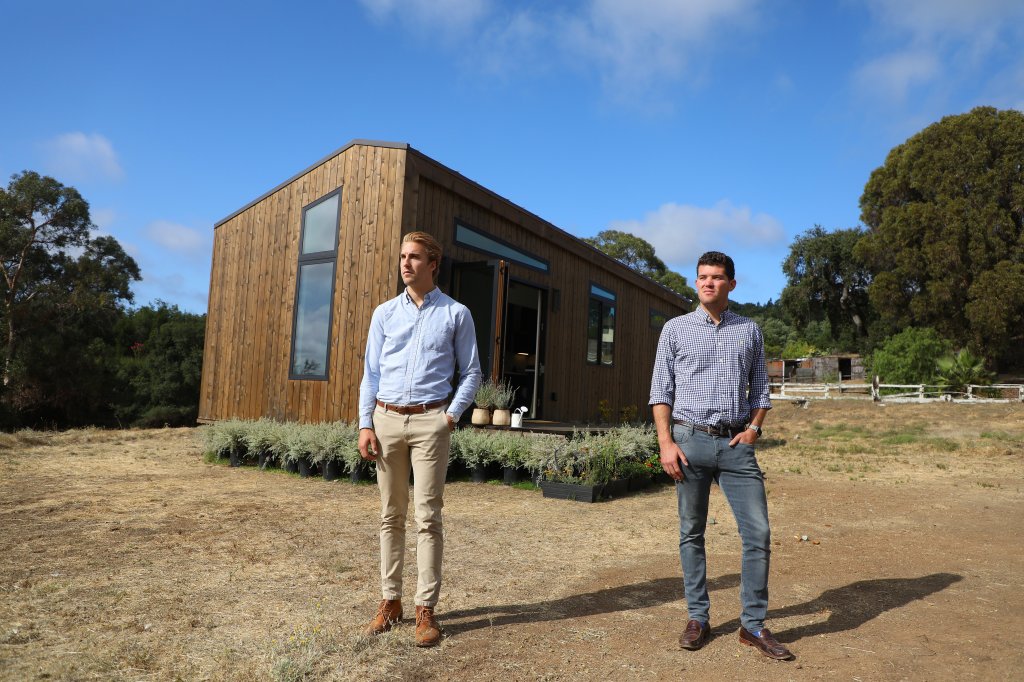[ad_1]
REDWOOD CITY, CA – SEPTEMBER 5: Eric McInerney, left, and John Geary, right, co-founders of Abodu are photographed in front of a modular home on Thursday, Sept. 5, 2019, in Redwood City, Calif. (Aric Crabb/Bay Area News Group)
The reasons a homeowner can dismiss building a backyard granny flat run the gamut — from complicated city permits to unexpected, exorbitant fees to neighborhood spats.
But some companies and cities are trying to clear up the red tape surrounding accessory dwelling units, or ADUs.
San Jose this month gave its first builder — Bay Area startup Abodu — preapproval to drop prefabricated homes in backyards across the city. The builder’s preapproved plans allow customers to get expedited and lower-cost city reviews. It could speed up installation to as little as two weeks, not including site preparation.
Abodu co-founder John Geary said the company aims to bring more transparency and ease to the construction of ADUs. “As a homeowner, it’s daunting and scary,” he said.
Other builders are also expected to gain pre-approval status from the housing-starved city. San Jose leaders hope to add 25,000 homes and apartments by 2022, and estimate that at least 120,000 single family homes in the city could legally accommodate an ADU.
“We won’t solve our housing crisis $650,000 at a time,” mayor Sam Liccardo said in a statement. “We have to bend the cost curve in order to build more housing.”
The city recently announced it was considering a partnership with the Housing Trust Silicon Valley to provide up to 200 forgivable loans for ADU construction. The loans, worth up to $20,000 for San Jose homeowners to cover planning and permitting costs, would be forgiven if a new unit is rented to low-income residents for five years.
San Jose last month launched a series of programs to streamline permitting for backyard units.
The push by the state’s third-largest city comes as California faces a housing shortage of an estimated 3.5 million homes and apartments. Planners and developers see in-law units as a promising way to chip away at the deficit in hot real estate markets with little open space to develop, like Los Angeles and the Bay Area.
ADU permits skyrocketed in 2017 after state lawmakers loosened regulations. But applications have slowed as homeowners have run into costly construction and rage-inducing red tape.
Craig Mizushima of Housing Trust Silicon Valley said efforts to streamline the permitting process are needed. “Lots of builders have been advocating for it for years,” he said.
Pre-approval streamlines a big and often confusing step for homeowners — getting city permits. City planners typically treat ADUs as new construction on par with building a new home. Reaching that standard of approval for homeowners has been costly and confusing for many would-be ADU builders, he said.
Abodu — formed from “abode” and “ADU” — is the idea of a pair of 26-year-old former business consultants and fueled largely by their life savings, they said. Geary, a Cupertino native and graduate of Sacred Heart Prep and Northwestern University, and Eric McInerney, a Michigan native, met at Bain & Company in Chicago.
Looking for an entrepreneurial challenge to break away from their heavy corporate workloads, they drew up a plan to bring cheaper housing to the Bay Area. “We’re pretty bootstrapped,” McInerney said. “We’re betting on ourselves.”
The company wanted to make it easier for homeowners to build an extra unit, with more transparency on costs for prep work and construction, Geary said.
Abodu has contracted with two modular home builders to produce 500-square-foot, one-bedroom, one bathroom units that can be fully equipped, furnished and shipped to a site.
The company negotiates with cities to get basic plans, inspections and permitting for the units upfront, cutting installation time to as little as two-weeks.
Base units start at about $200,000, with upgrades available for appliances, roofing and exterior features. The team has partnered with developer Edenbridge Homes in Cupertino, where Geary’s father, Patrick, is a partner, to do installation and site work.
Homeowners have two primary concerns — will it trigger a reassessment of their property, and what will it look like, McInerney said.
The addition of an ADU will increase the city assessment of a home, but will not trigger a full reassessment up to market value, McInerney said. Prop 13 protections from major increases remain in place. The company estimates that the additional taxes would cost between $1,000 and $2,000 annually.
The company has a few designs to allow custom facades, including a fiber cement surface that can be painted to match the main house.
The company has set up a model home in Redwood City and has been negotiating with other cities to win preapproval for customers. The company has about a half-dozen customers so far and expects to install their first unit by the end of the year.
[ad_2]
Source link
